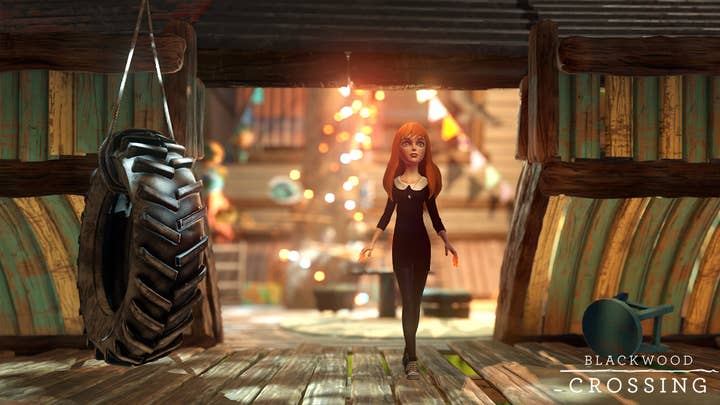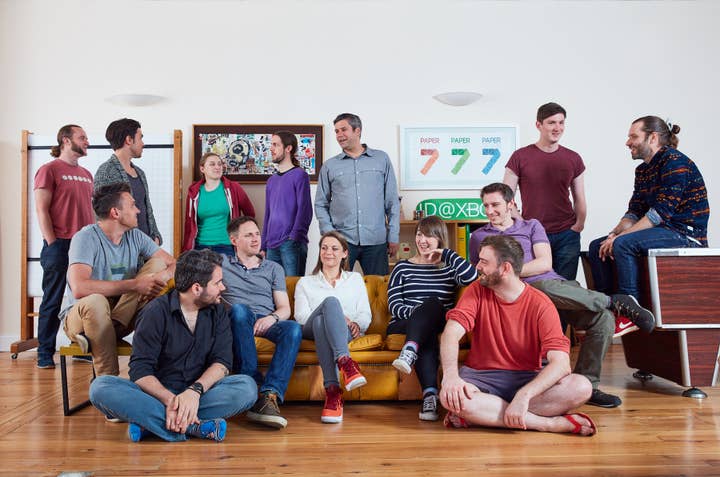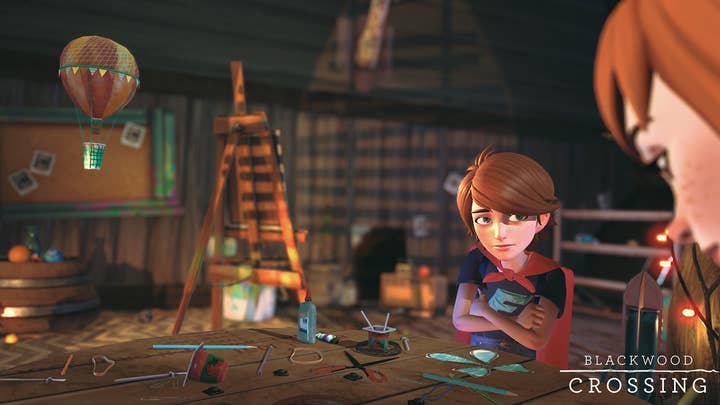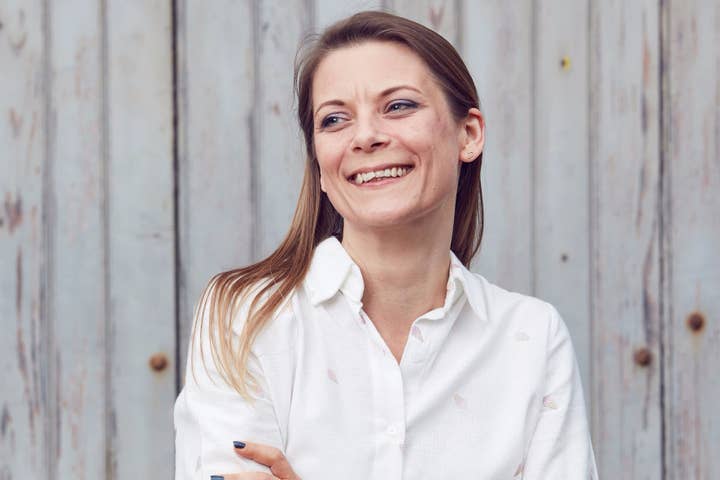"We've dug our heels in a bit"
Alice Guy leads PaperSeven out of the free-to-play valley with Blackwood Crossing
PaperSeven's small Hove office is split neatly in two. At the far end, a thrumming hive of activity: desks, monitors, the quiet intensity of hard work. The other, larger half is a well lit room filled with artfully battered mid-century furniture, beautiful prints and a prominent pool table - like a blueprint for an aspirational loft apartment from a glossy magazine. I remark on what a pleasant environment it creates. Studio head and MD Alice Guy smiles. "We're quite into aesthetics."
Looking at the studio's new project, that much is obvious. PaperSeven was founded in 2011, another fragment of the Black Rock which Disney shattered. For the first few years, it was a work for hire studio, working on solid brand games like the successful Made in Chelsea adaptation, Guy and her team worked hard to establish a base of business and a reputation for style. Now, that's paying off, as the 14-person team gets its teeth into their first ever original IP: the newly announced Blackwood Crossing.
It's a beautiful, distinct game. Built in Unity, Blackwood Crossing follows the story of young siblings Scarlett and Finn as they board a mysterious train on a journey to lands unknown. What follows is a intense but lighthearted exploration of the darker end of the human emotional spectrum: loss, anger, sadness and guilt - a difficult balance for any entertainment, but an area in which Guy feels comfortable and confident.

"It was ultimately where we knew we wanted to be, but we had to get ourselves there," she explains. "We had to build a team that could create that work. And we also had to build ourselves, I think, our culture. Just cut our teeth a bit, because although we'd been in games for-, between the three of us (the management team of Guy, her art director husband Ryan and tech director David Jefferies) we're nearing on 50 years. There's nothing like running your own business to teach you some hard and fast lessons. I think if we'd gone straight into what for us is now a big project, big team - on one level a brilliant, creative ambition that's also quite high risk - I think we would've floundered a bit.
"I think, kind of, it's fair to say that the industry was very mobile-driven in 2011 when we left, and we were actually hoping that we would see more advances in the WebGL market. We were hoping to take some of our 3D experience from games into that area. WebGL and HTML5, never really took off, but still, mobile development offered a relatively easy route to market, and the development costs were low. So I think part of it had to come down to just that sort of black-and-white fact that it was cheaper for us to do. But once we'd built up the team we had built up an awareness of everyone's strengths and weaknesses within the management team and the team as a whole, we felt able to move into doing our own IP, and that started on mobile and is now PC, console. That's how the journey has happened."
"We have done a few free-to-play projects...it's not impossible to be creative...but you are ultimately trying to work out how to get as much money as possible out of the player"
Although mobile is still seen as the most open, accessible platform, where it's easiest to experiment, it's an extremely difficult market in which to marry creativity to success. The app stores have settled into a disappointing cycle of predictability even more quickly than previous store fronts, the top ten grossing chart a insurmountable fortress of user-acquisition budgets and familiar mechanics. There are studios making interesting games for mobile, but the risk of sinking without a trace because you tried to do something genuinely different is all too real. Guy believes she's picked the right time to return to console development.
"We have done a few free-to-play projects, and they're not...it's not impossible to be creative, but you're making design decisions based on factors that aren't necessarily predicated on enjoyment and creative expression. You know, you can try as far as possible to bring story into it and to make it really sexy and look great, but you are ultimately trying to work out how to get as much money as possible out of the player. The cost of user acquisition is now just so totally crazy that unless you're a big player you're gonna struggle. So we kind of realised quite quickly that that isn't what we wanted to do longterm, we just had to work out a way of getting there and that's what we've done. It's all come together to allow the independent studios like us to deliver on console for budgets that are more palatable than they obviously were when we were at Black Rock."

Guy is in good company. Many of the most interesting and successful digital projects of late have been games which have dealt with emotional journeys and the human condition. With titles like Firewatch and Everybody's Gone to the Rapture setting an excellent precedent, is the team sure that there's an audience which wants to experience complex or difficult emotional experiences when they play?
"I think actually for a story that is dark, is very sad, and challenging emotionally, you're coming out of it with a sense of warmth and, I guess, relief. That's what, ultimately, the main character is going through. You know, she's coming to the point of acceptance and moving on. And I think what we've tried to do with the structure of the story is ensure that there's light and dark, through the light and playful moments you're giving the player some relief from the depth of the emotion and the darkness of the emotion that you're taking on.
"It's quite funny when you're developing a game like this, you can become slightly glib about the content that you're creating. What's really nice is when there are a couple of people on the team who do still get genuinely really affected by the elements of the story and what they're seeing, even though they know it, even though they've been part of it since day one, they still find it really affecting. But it is challenging. But I think that's what we want to do as a studio. We want to create experiences that make people think and that are meaningful, and I guess go beyond the cliches of a lot of games that are out there. There are definitely more and more games doing this. I'm not saying that we're revolutionary. But it is a constant driver for us to go beyond the cliches and explore characters that you wouldn't actually always explore in games. Maybe that's just part of getting old and being parents."
"I think that's what we want to do as a studio. We want to create experiences that make people think and that are meaningful, and I guess go beyond the cliches of a lot of games that are out there"
There's another difficult aspect to Blackwood crossing. So much of the story of the game pivots on a single spoiler - an early twist which explains the surreal nature of the game and Scarlett's surroundings, and frames the ongoing narrative themes of the entire game - that it's extremely hard to talk about any of the plot without ruining the surprise. That poses potential problems for marketing, and for review coverage.
"I think it is definitely a challenge, because we really believe in our story, yet we can't talk about it," says Guy. "We can't talk about it all. And yeah, that's just a challenge that we're dealing with, but what is nice is instead you have to focus on providing a sense of intrigue to the player, showing them just enough to want to find out more. You just have to turn these things into an opportunity and subvert the player a little bit in the marketing, which is an interesting concept.
"It is a fine balance. Thinking about a movie, how they would market a tragedy, they would allude to it but, you know, they wouldn't tell you it's going to happen, so why should we do that in games? But you'd also know that within minutes it's going to be somewhere available to people to find out. So all you can do is find your own pitch for it and push that. But yeah, we would love to talk more about it, and we will ultimately when the game has been out for a while and we can explore the key messages and key themes in more depth at that point."

Despite that difficulty, PaperSeven is very much keeping control of its own messaging, partnering with fellow ex-Black Rockers Trailer Farm for a trailer, but otherwise eschewing agencies and handling everything in house. Guy says it's partly practical, partly stubbornness.
"We've dug our heels in a bit," she says with a smile. "We've basically said, 'Look, we want to be in control of all of the assets,' because there was talk-, you know, when you're juggling so much, and as we kind of are as a small team, there was talk of agencies getting involved to do the screenshots and all of that, and we're just like, 'No. Absolutely not.' They don't know the angles of the game, they don't know where the beautiful moments lie and the beautiful lighting. That's stuff we've crafted for over 12 months. We're not gonna hand it off for the most important bit.
"People like Trailer Farm, they're experts in their field. We know them really well, we trust them, we have a great rapport, but yeah, we were very clear and pigheaded, in a good way, that we were gonna stay in control of that. And I think that's one thing that falls back to when we were with Black Rock is that although we're independent and we're a young studio, we have that experience and that slight arrogance. Not horrible arrogance but the belief in our own abilities that we can say, 'No. This-, we're really passionate about this and we really feel strongly about this, even though you might be paying for it. It's got to be this way.' So far that's been okay. But that's why Standfast have given us the funding they've given us: partly due to our experience and partly due to the fact that we know what we're doing. Hopefully we'll be able to reward them with a really strong game that sells well."

